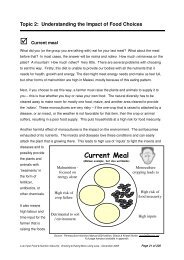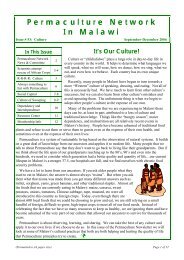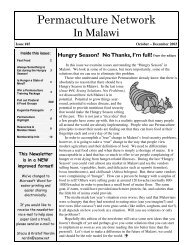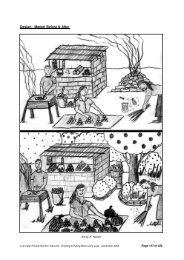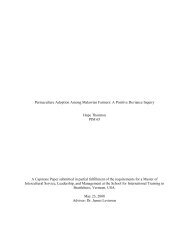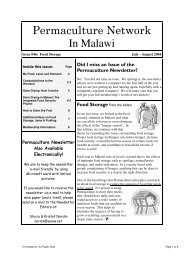Harmonisation of seed laws in Africa.indd - Never Ending Food
Harmonisation of seed laws in Africa.indd - Never Ending Food
Harmonisation of seed laws in Africa.indd - Never Ending Food
You also want an ePaper? Increase the reach of your titles
YUMPU automatically turns print PDFs into web optimized ePapers that Google loves.
GRICULTURE, ENERGY AND LIVELIHOOD SERIES<br />
However, these figures discount the effect <strong>of</strong> the millions <strong>of</strong> US dollars that AGRA has pumped <strong>in</strong>to<br />
build<strong>in</strong>g up the <strong>seed</strong> sector <strong>in</strong> these priority countries. These figures <strong>in</strong> any event represent sales and<br />
not farmers’ experiences with the <strong>in</strong>troduced <strong>seed</strong>s.<br />
<strong>Harmonisation</strong> <strong>of</strong> PVP policies and <strong>laws</strong><br />
Generally speak<strong>in</strong>g, most <strong>Africa</strong>n countries have modelled their IP <strong>laws</strong> on those <strong>of</strong> their former<br />
colonisers, <strong>in</strong> particular the United K<strong>in</strong>gdom, France and Portugal. Dur<strong>in</strong>g the mid- to late 1990s,<br />
there was a rush to implement IP <strong>laws</strong> <strong>in</strong> the develop<strong>in</strong>g world to comply with the WTO’s TRIPs<br />
agreement, and two <strong>Africa</strong>n regional organisations responsible for <strong>in</strong>tellectual property rights were<br />
formed: OAPI (Organisation <strong>Africa</strong><strong>in</strong>e de la Propriete Intellectuelle ) and ARIPO (<strong>Africa</strong>n Regional<br />
Intellectual Property Organisation).<br />
OAPI countries<br />
ARIPO<br />
Source: http://www.<strong>in</strong>venta-<strong>in</strong>ternational.com/aripo<br />
OAPI Members<br />
ARIPO Members countries<br />
OAPI was established <strong>in</strong> 1977 by way <strong>of</strong> the Bangui Agreement and it represents 16 countries <strong>in</strong> West<br />
and Central <strong>Africa</strong>; its headquarters are situated <strong>in</strong> Yaounde, Cameroun. 59 The Bangui Agreement<br />
was revised <strong>in</strong> 1991 when it was brought <strong>in</strong> l<strong>in</strong>e with the TRIPS agreement and it committed<br />
its members to comply with UPOV 1991. However, very few <strong>of</strong> its members have implemented<br />
PVP at the national level. Most <strong>of</strong> OAPI’s members are least-developed countries for whom the<br />
adm<strong>in</strong>istrative requirements will be onerous and where up to 95 per cent <strong>of</strong> the <strong>seed</strong> is farm saved,<br />
mak<strong>in</strong>g plant breeders’ rights rather irrelevant to the economy. <strong>Never</strong>theless, the Bangui Agreement<br />
<strong>Harmonisation</strong> <strong>of</strong> <strong>Africa</strong>’s <strong>seed</strong>s <strong>laws</strong>: a recipe for disaster 23



